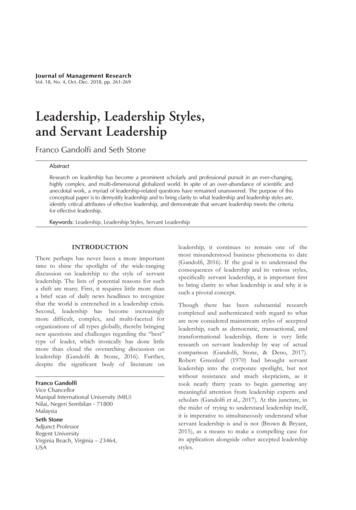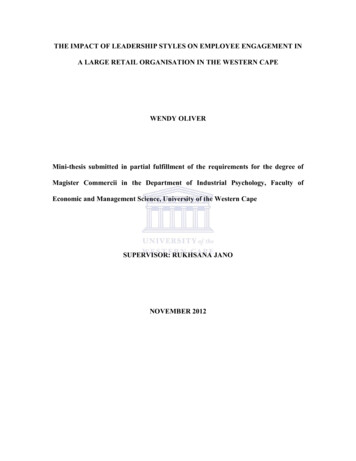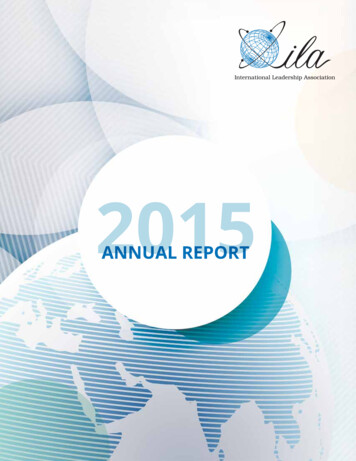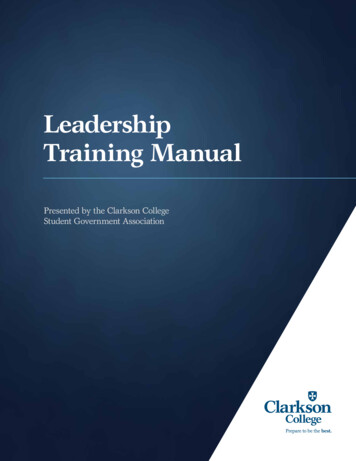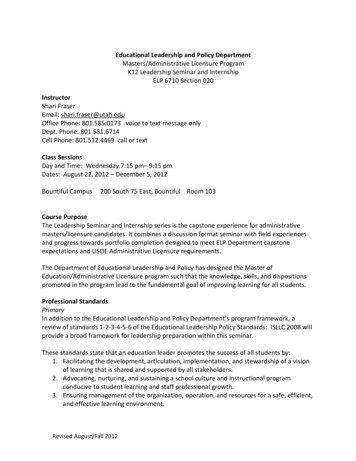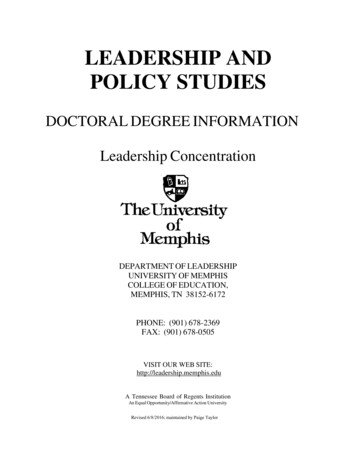
Transcription
LEADERSHIP ANDPOLICY STUDIESDOCTORAL DEGREE INFORMATIONLeadership ConcentrationDEPARTMENT OF LEADERSHIPUNIVERSITY OF MEMPHISCOLLEGE OF EDUCATION,MEMPHIS, TN 38152-6172PHONE: (901) 678-2369FAX: (901) 678-0505VISIT OUR WEB SITE:http://leadership.memphis.eduA Tennessee Board of Regents InstitutionAn Equal Opportunity/Affirmative Action UniversityRevised 6/8/2016; maintained by Paige Taylor
Administrators, Educational Researchers, and Policy AnalystsIntroductionThe Memphis Executive Educational Leadership Collaborative Program (MEX ELC)evolved out of the recognition that schools are open social systems requiring theinteraction of various groups at different levels. Two of the critical groups are leadersat the central administrative level and the school level. The efficiency andeffectiveness of leadership in central administration and its connection with leadershipat the local school level is vital to the success of individual schools.This program is designed to address a noticeable void in the current reform movement.It specifically addresses processes and procedures that school leaders can use to makeand sustain a leadership connection in a positive manner. Participants will developskills in aligning activities at the central office level with assessed needs at the locallevel. This allows for central office administrators to provide support services to localschools that will not only enhance the academic achievement and academic progress inindividual schools but also on a district-wide level.Classes for the doctoral cohort are offered in Memphis and Jackson campuses.Employment OpportunitiesIt offers opportunities for advanced professional specialization and includes adissertation. Program objectives are: (1) a strong knowledge base in policyformulation and interpretation, and (2) the development of skills and dispositions forleadership positions in organizations with educational emphases.Students achieving this degree could be employed by school districts asadministrators, educational researchers, and policy analysts. They could also serve inan educational responsibility in a military, medical, business, governmental, or nonprofit organizational setting. They would qualify for employment by institutions ofhigher education in administrative positions and for broad public service areas.Program RequirementsThe program requires 54 hours beyond the master’s degree. The following courses arerequired for the concentration (33 dership in OrganizationsAmerican Society and Educational PracticePolicy Oriented ResearchPersonnel AdministrationSchool Finance2
LDPSEDPREDPRLEAD8111854185429000Educational Administrative PerformanceStatistical Methods Applied to Educational Research IStatistical Methods Applied to Educational Research IIDissertation- 9 hoursOther recommended courses are:LDPS 8181 Policy Implementation in Education Admin.LEAD 8140 Planning of Educational ChangeLDPS 8180 Politics & Power of Educational LeadershipLDPS 8305 Issues in Educational PoliciesLDPS 8320 Urban Education: Historical & Contemporary PerspectivesLDPS 8330 Race, Ethnicity and Gender in American EducationLEAD 8500 Adult Learning and LeadershipLDPS 8350 Policy and Practices of Contemporary American EducationA maximum of twelve (12) hours of transfer credit/credits earned as non-degree canbe counted toward the degree.The Department of Leadership as the Source for This DegreeProfessors in the Policy Studies concentration are qualified to teach courses leading tothe degree because of their experience in varying types of educational settings,including public schools, business, government, and the military, wherein they havebeen involved in establishing, interpreting, and applying policy.Students completing this degree will have developed skills effecting leadership,change, and policy formation; will have had opportunities to analyze data and itsrelationship to organizational effectiveness; and will have achieved a vision ofeffectiveness that is shared by experts. They will have had experience in evaluatingpolicies and assessing their effect.Faculty Engagement in the Degree ProgramFaculty members supervise the degree program of each student, provide leadershipand monitoring, guide a research project produced by the student, and conductcomprehensive examinations. They are actively engaged in formative and summativeevaluation procedures to guarantee the program’s integrity and currency.Degree RecipientsThe research of individuals receiving a degree in this concentration can be found onthe university website.Dr. Sharon Griffith, Director of Shelby County I-Zone Schools3
Dr. Angel Brown, Principal, Kate Bond Elementary, Shelby County SchoolsAdmission ProceduresTo be admitted to post-master’s degree candidacy, each student must meet all GraduateSchool requirements and then complete a candidacy file in the Department ofLeadership. All requirements for admission or readmission to the university must becompleted before registration is authorized. Applications will be reviewed onNovember 1 and April 1 of each year.Requirements of the Graduate School1. An application to the Graduate School can be obtained at the following web oc.html. When filling it out, indicatethat the major is Leadership and Policy Studies and that the concentration is PolicyStudies. Complete the application and submit it. A fee will be charged at the end of theapplication process.2. An official report of the Graduate Record Examination (GRE) score. [Verbal &Quantitative Scores]For questions regarding GRE testing or other information regarding the GraduateSchool, call Graduate School Admissions at 901-678-2911. The Testing Centernumber at the university is 901-678-2428.3. Official transcripts of all prior undergraduate and graduate courses.After the application has been received by the Graduate School, the application fee hasbeen paid, the transcript (s) has (have) been received, and the GRE scores have beenreceived, a Departmental Recommendation Form will be sent to the Department ofLeadership.Department of Leadership RequirementsThe following are the requirements of the Department of Leadership:1. Documents*a. Resumeb. Three professional letters of recommendation on letterheadc. A portfolio (see attached sheet) should be submitted as soon as possible, but mustbe received no later than two weeks prior to application deadline (contact thedepartment for deadline dates). The portfolio MUST contain the followingdocumentation:4
(1) Letter of application to the department(2) Statement of goals(3) Current resume(4) Official transcript(s)(5) Philosophy of education statement2. A writing assignment to be completed on a computer one hour prior to aninterview. The topic will be based on a current educational issue.3. An interview with faculty members*Please submit documents to the Department of Leadership before the writtenexercise and the interview.For the delivery of portfolio materials, office hours are: M-F 8:00 a.m.- 4:30 p.m.Please contact:Ms. Janet RobbinsDepartment of Leadership Ball Hall, Room 123University of MemphisMemphis, TN 38152 3570(901) 678-2369, (901) 678-0505 (FAX)jcrbbins@memphis.eduFor additional information contact:Dr. Reginald Leon Green, Professor and Program Coordinator 901678-3445, 901 678-0505 (FAX)Rlgreen1@memphis.eduAfter the materials have been received, the writing assignment has been competed,and the interview has been conducted, a decision about the application will be made,based on a holistic profile that includes, but is not limited to, information contained inthe completed application packet described above and obtained during the personalinterview.A letter will be sent from the department notifying the student of its action, and anadvisor will be named where applicable. It may precede the official letter ofadmission sent to the applicant from the Graduate School.Linkage to the Graduate School Web PageFor detailed information about this doctoral program, click onhttp://coe.Memphis.edu/graduate-programs.htm, then click on Graduate Handbook5
Doctoral Degree Programs and on COE Graduate Office Forms (the College ofEducation, Health and Human Sciences requires some forms that are not required bythe Graduate School).6
Program of StudiesDepartment of LeadershipEd.D. Degree in Leadership and Policy StudiesConcentration in Policy StudiesStudent’s SignatureStudent’s University IDCourse No.Sem/YearScheduledCourse TitleCreditHrs.RequiredLEAD 8001Educational Leadership inOrganizations3RequiredLEAD 8002American Societyand Educational Policies3RequiredEDPR 8541EDPR 8542Statistical Methods Appliedto Education IStatistical Methods Appliedto Education IIRequiredLEAD 8003RequiredLDPS 8121RequiredLDPS 8132RequiredLDPS 8111RequiredLEAD 900033Policy-Oriented Research3Personnel AdministrationShcool Finance33Educational AdministrationPerformance3Dissertation9Electives (21 hours)(1) LDPS 8181(2) LEAD 8140(3) LDPS 8180(4) LDPS 8305(5) LDPS 8320(6) LDPS 8330(7) LEAD 8500Policy Implementation in Education AdminPlanning of Educational ChangePolitics & Power of Educational LeadershipIssues in Educational PoliciesUrban Education: Historical & ContemporaryPerspectivesRace, Ethnicity and Gender in AmericanEducationAdult Learning and LeadershipTOTALAdvisor's SignatureDate3333333354Department Chair's Signature7DateGrade
How to Design the PortfolioA portfolio is a subjective compilation of materials displaying a person’s talents,proficiencies, and demonstrating knowledge and skills. What is included in aportfolio depends upon the person answering the question, “ What am I trying totell the reader about myself?” Before beginning the portfolio, begin planning bythinking about the purpose and the audience. For the purposes of this portfolio, theapplicant should attempt to demonstrate the knowledge, skills, and experiences thatthe applicant has had that are preparing the applicant to prepare for the role inadministration - a leader in the 21st century. Reflecting on the purpose andaudience can assist in determining the best way to develop the portfolio.Claims about your experiences, knowledge, and skills will be most convincing tothe evaluators when they are supported by documentation from a variety of sources.Much of the material and data that can be used are regularly gathered,which makes constructing this section of the application less daunting than it mightat first seem. Useful evidence can take many forms, and needs to be carefullyselected and presented. The portfolio should be well organized, easy to read andunderstand, and look professional. It is important to spend some time deciding howto organize and present the data the applicant has gathered. The applicant might asherself/himself, “Have I selected, organized, and presented the data in a way thatbrings the most compelling evidence into focus for the evaluator? Does each pieceof evidence serve a purpose, supporting a claim made about teaching, service oradministrative experiences I want to demonstrate? Does the portfolio give theevaluator a sense of who I am? my goals? my intent to be an administrator andleader?”This document is a visual record of your accomplishments, achievements,strengths, and experiences. It is a reflective summarization of your career to date,and a statement of your intent to continue to advance to your desired goal inadministration.(1) Letter of application to the department(2) Statement of goals(3) Current resume(4) Official transcript(s)(5) Philosophy of education statementThank you for your portfolio submission. The faculty will evaluate your portfoliousing a scoring rubric. This score will become part of your overall rating for yourapplication. The following areas will be assessed:1.2.3.4.5.Structure of the PortfolioConcepts and Content about Teaching and LearningKnowledge and ApplicationProfessional Growth and DevelopmentLeadership Activities, Behavior, and Experiences8
(2) LEAD 8140 Planning of Educational Change 3 (3) LDPS 8180 Politics & Power of Educational Leadership 3 (4) LDPS 8305 Issues in Educational Policies 3 (5) LDPS 8320 Urban Education: Historical & Contemporary Perspectives 3 (6) LDPS 8330 Race, Ethnicity and Gender in American Education 3 (7) LEAD 8500 Adult Learning and Leadership 3 TOTAL 54

